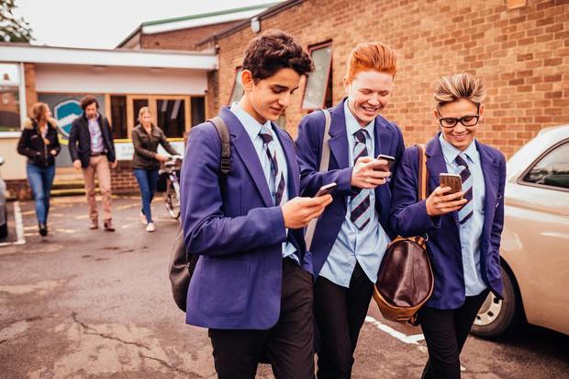
For the first time in years, a rugby ball has broken a school window, school breaks are more talkative, and students are more active at one of the country’s largest secondary schools.
But that’s not an unwelcome change for Mount Albert Grammar School headmaster Patrick Drumm, who has noticed a significant shift in culture since banning cellphones in school.
Prior to the Government enforced nationwide ban this year, the school of about 3400 students moved towards a ban on cellphones during school hours at the start of last year, due to growing concern about the effects the devices were having.
Drumm describes how break times have gone from students passively sitting, heads down, not interacting and looking at their screens, to lots of talking, movement, and sports games. The school has installed more handball courts to meet that demand.
“We’ve had to make sure we’re more active in our supervision, bringing back some of those rules about kicking rugby balls in the quad which disappeared because students weren’t doing that,” he said.
“Now, there’s certainly a desire to get back and interact with lunchtime games and we’re delighted with that.”
Drumm said it’s a small but significant step towards “getting back to some of the good old ways of connecting with people”.
Concerns raised when the government policy was announced about how parents would contact their children have not been an issue at the school, and parent feedback has been positive.
Being a large school, they have relied on students self-policing, but Drumm said the young people understand the reason behind the ban and are enjoying being more active again.
Papatoetoe High School principal and Secondary Principals’ Association New Zealand (SPANZ) president, Vaughan Couillault, said at his school, the ban has made it easier in the classroom, but more challenging outside the classroom, in trying to police the ban.
“It took away a little bit of in-class conflict, cause now it’s a piece of legislation as opposed to a rule the school is making themselves.”
He has not noticed as large of a culture shift at his school and said students were active during breaks before the ban.
In his role as SPANZ president, Couillault said feedback from schools has been varied. Some have decided enforcing the rule outside the classroom during breaks is not something they want to engage in, but have supported the ban inside the classroom, to limit distraction.
Couillault would have preferred a government policy combating vaping, which he believes is a bigger issue in schools.
“Kids aren’t leaving class to use their cellphones; they’re wagging class to cloister covertly in toilets and vape.
“However, I’m always happy to take it on the chin and say the cellphone ban probably has added value to the work we are doing on campus rather than distracting from it,” he said.
Shannon Johnstone is a journalist at Newstalk ZB based in Auckland covering education and general news. She joined Newstalk ZB in 2021 and previously worked at Hawke’s Bay Today.
- Government moves on school cellphone ban, an hour of maths, writing, reading
- More socialisation between students and less distraction in class after phone ban, principals say
- What you need to know about the school cellphone ban
- 'One of the best things I've done': Schools with phone bans already in place report positive results
Take your Radio, Podcasts and Music with you









